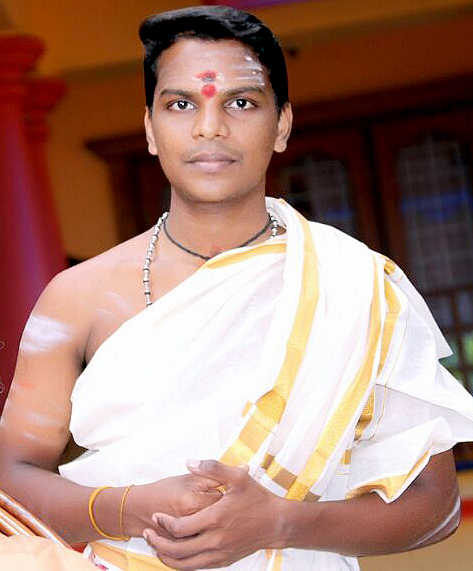
“It’s not a job, it’s service to God. So I am happy, but not particularly elated about the appointment. It is just my duty,” YaduKrishna
Born in an SC Pulaya family, and now 22-years-old, Krishna is among the six so-called “Dalit” priests recruited by the Travancore Devaswom Recruitment Board recently. Yadukrishna is the son of Ravi and Leela, both daily-wage workers. He was spiritually inclined even as a child and would visit the nearby Bhadrakali temple everyday, even though the was puja only during weekends, he recalls.
“My mother is a hardcore devotee. She makes garlands for nearby temples whenever there is a puja. My parents have struggled a lot to bring me and my brother up. What I have gained is due to the blessings of my parents and my guru,” he says.
After Class 10, he began pursuing studies in Sanskrit and thantri thantram (learning to perform pujas and other rituals) at the Vidyapeedom.
“The duration of the thantri thantra course is 20 years. I have finished only ten years. Learning the mantras and the way of performing of puja in Sanskrit is not easy. It is very tough,” Yadu says.
Below are excerpts from his interview given to NewsMinute & ToI

What is your family background?
My parents were daily wagers. My father still goes to work. At six I started working as a helper to a poojari at a nearby temple. From Class 7, I started attending the Gurudeva Vaidika Thanthra Vidyapeedom at North Paravur in Ernakulam district. It was a turning point in my life. Until then, I never thought of studying beyond the 12th.
Why do you call it a turning point?
When my guru, Brahmasree KK Anirudhan Thanthri, invited me to Thanthra Vidyapeedom he didn’t even know my caste. Only when he saw my certificates he realised I was a Dalit. But this did not matter to him at all. The vidyapeedom did not charge any fees. When I joined, there were seven children in our batch. There were students from all castes. We would all eat together with my guru and study together. The priests there helped finance my formal education and even supported our families financially. Once, we were unable to repay a loan and the bank moved to attach our house, the shanthis came to our rescue.
How did the vidyapeedom take this route to social inclusion?
My guru came up in life the hard way. He is 62 years old now. He is from the Ezhava caste. He had to overcome many challenges in his childhood to become a priest and suffered a lot in his life. He rose to become the tantri (high priest) at many big temples. He began the vidyapeedom 30 years ago to help youngsters from poor families, and those prevented by caste restrictions, become priests.
Have you completed your ritual and religious training?
I have a long way to go. I know enough to perform the rites and rituals that a temple priest needs to know. I don’t think I may ever complete my learning. This is a vast ocean of knowledge. There are several rituals, like those related to consecration of deities and many more scriptural texts that remain to be learnt.
There are campaigns in social media that priestly jobs should not go to non-Brahmins. How would you respond?
I have not heard anything about that. Here people have welcomed me wholeheartedly and nobody has problems with me being their temple priest. All local political party leaders and social activists came to congratulate me.
If you look at Kerala’s history of social reform, do you see your appointment as a continuance of the work begun by Sree Narayana Guru and Ayyankali?
Yes I have thought about this. The credit for my appointment lies in the path that my guru forged so many decades ago. If he was not there to train me I would not have been able to achieve this. His tutelage was completely free. In this day and age no one will teach you a skill for free. When you pay money to learn it becomes a material acquisition but mine was a spiritual and uplifting quest.
When asked if he faces discrimination because he is from a Dalit community, he hesitates to answer, and then says, “I haven’t faced discrimination in any phase of my life. Here I am staying with a Gouda Saraswata Brahmin. When I came here, he willingly offered to stay with me. He said that whichever caste I am from, I am a human being, and that is what matters,” Yadu says
“I haven’t gone through any bitter experiences till now. The devotees and committee members of Valiyakulangara temple gave me a warm farewell. There were people of all castes. Elderly women were crying when I left, for me too it will take time to come out of the sorrow,” he says. “Even at Gurudeva Vidyapeedom, Brahmins and non-Brahmins stayed together.”
Courtesy : ToI & News Minute














